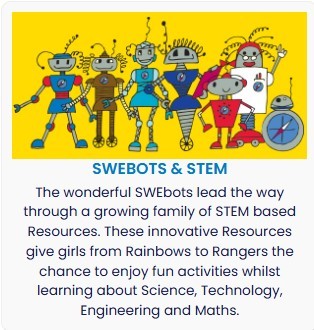
Resources
Interested in learning more? On this page are sections about: AI, staying safe online, combatting cyber bullying, digital literacy, resources for schools and parents, technology and maths, cyber careers, games and having fun in the digital world, cyber education, general interest, general resources for maths and science pupils, mindfulness and physical activity, and early learning.
We have assembled a huge range of resources for schools, pupils, parents and others – take your pick from the links we have included below…
New ideas for this section are welcome – just get in touch through info@thecybertrust.org.
AI (Artificial Intelligence)
In the context of AI and cyber safety, here are a couple of PDF documents from our supporter Annie Benzie (researcher at Cardiff University focusing on disinformation on social media platforms):
Staying safe online
Get Safe Online and Cifas’s “Check a Website” page (2012 and updated regularly) is excellent – an innovative new feature that invites you to check a website is safe to use before accessing. http://getsafeonline.org/checkawebsite
Overall, Get Safe Online is a fantastic resource including lots of tips about staying safe in a digital world.
Child sexual abuse (and associated material – CSAM) is unfortunately all too common, especially in the digital age. This guide from Andreozzi and Foote provides information and resources to prevent sexual abuse and help survivors, caregivers, and other parties better understand the issue. It is written from a US viewpoint and in US English. https://www.victimscivilattorneys.com/survivors-guide/prevention-support/
You can test a website for malware etc using Sucuri Sitecheck: https://sitecheck.sucuri.net/
NCSC have developed “CyberSprinters” (2023), exciting interactive online security resources for 7 – 11 year olds. https://ncsc.gov.uk/collection/cybersprinters
My Tutor have published The Parents’ Guide to Teaching Your Teen Online Safety (2023), covering the most popular social media platforms for teens, how to stay safe when socialising online and the connection between Influencers, body image, and mental health. https://mytutor.co.uk/blog/parents/the-parents-guide-to-teaching-your-teen-online-safety/
The Cyber Trust has collaborated with the ITU Child Online Protection (COP) team, a specialised agency of The UN since 2021 in the development of their AskMe App (2023). https://itu.int/cop/askme/
Online safety is more important than ever; the Better Internet for Kids organisation has warned about manipulative marketing in games. https://better-internet-for-kids.europa.eu/en/learning-corner/parents-and-caregivers/marketing-games
Gabb have created a resource called A Guide to Modern Tech Safety for Kids and Teens (2023). https://gabb.com/blog/tech-safety-guide/
Coupon Follow have created a guide to online privacy protection and internet safety. https://couponfollow.com/research/parents-guide-to-online-privacy
Octane Seating have produced an educational guide https://octaneseating.com/blog/safe-streaming-kids/ for parents on safe media streaming for kids. Although it is rather US Centric, much of the advice is applicable in the UK, containing valuable information on:
- Safe Cyber Safety Habits
- Ways to monitor a child’s internet use
- A film rating system
- Tips on device security and parental control options
- Pricing, content ratings, and more
Broadbandsearch.net devised “17 Rules to Protect My Child Online” (2024 update) during the Covid crisis, but equally relevant subsequently. https://broadbandsearch.net/blog/internet-safety-kids
Start a conversation with a quiz for 11-14 year olds, part of the annual Safer Internet Day (2023) https://saferinternet.org.uk/safer-internet-day/safer-internet-day-2023/quiz-for-11-14s
Cyber security quiz to build knowledge of risks: created by Virgin Media O2 experts to build awareness and educate users of all ages on how to better protect themselves from online threats (2025). https://www.virginmedia.com/blog/online-safety/cyber-security-quiz/
Verizon have published “What is Cybersecurity? Overview, Best Practices and Resources” (2022). It is a thorough, well-researched explanation of the principles of good cyber security. https://verizon.com/about/blog/what-is-cybersecurity
Helping your child with WhatsApp (2022) is a useful blog post from the UK Safer Internet Centre. https://aferinternet.org.uk/blog/helping-your-child-with-whatsapp?s=03
“Internet Safety for kids” (2025), recommended by CyberGhost contains useful check tables. https://privacyhub.cyberghostvpn.com/privacyhub/internet-safety-for-kids-guide/
Internet Access for Kids (2023), recommended byservice provider InternetAdvisor. https://www.internetadvisor.com/internet-access-for-kids-parents-guide
“Cyber Security Threats: How Students Can Protect Their Data” (2025), recommended by a writer at the Ivy Panda Blog: https://ivypanda.com/blog/cyber-security-threats/
An IDStrong article on “Why you Should Watch Out for Teen Identity Theft” (2021), states that children and teens can easily be victims of scammers, hackers and identity thieves so it is extremely important to protect them from different types of identity thefts: https://www.idstrong.com/sentinel/why-you-should-watch-out-for-teen-identity-theft/
MyVision.org have developed guidance (2022) https://myvision.org/guides/screen-time-guide/ around the negative effects of extended screen time on the eyes, minds, and bodies of children, covering:
-Problems screens can cause
-How to develop screen time rules
-Suggested screen time limits by age
-Teaching and encouraging digital literacy, and more.
PasswordManager.com has provided some tools and resources to educate online users about password managers (2025): https://www.passwordmanager.com/best/
The IvyPanda Blog team have published a “Scams in College and How to Avoid Them” (2023) infographic describing various scams directed at college students and the ways to prevent being scammed: https://ivypanda.com/blog/scams-in-college-and-how-to-avoid-them/
Cyber Bullying
What Is Cyberbullying and How to Prevent It is a valuable resource for spotting the signs of, and helping to prevent, cyber bullying.
Router Network have created an anti-bullying guide that is a compilation of resources to help any kids who may be experiencing bullying either online or offline: https://router-network.com/education/anti-bullying-guide
Supporting children through the challenges of bullying, especially online, is so important. WizCase have developed a helpful guide: https://www.wizcase.com/blog/a-comprehensive-cyberbullying-guide-for-parents
Often cyber bullying victims don’t receive the help they need. This can lead to mental health issues such as social anxiety, depression, suicidal thoughts, and self-harm. Sunshine Behavioural Health (USA) have produced a guide: https://sunshinebehavioralhealth.com/resources/preventing-cyberbullying/
Another interesting article can be found at https://privacyhq.com/news/all-you-need-to-know-cyberbullying-prevention/
How to spot the signs of bullying at school by Engage Education is a useful guide to help teachers and parents recognise the signs of bullying at school and the harmful impacts it can cause on mental health – and to raise awareness of how to stop bullying.
The New Hampshire (USA) STEM Club for Girls via Hampton Public Library recommend a Nominus publication – ‘Cyber Bullying: A Guide to Internet and Computer Safety’ guide that one of their members discovered: http://www.nominus.com/en/dm/blog/hosting/cyberbullying-a-guide-to-internet-and-computer-safety
Allconnect have written a useful free blog on how to identify and handle online harassment. https://www.allconnect.com/blog/cyberbullying-how-to-identify-and-handle-online-harassment includes detailed infographics on types and signs of cyberbullying, steps on handling online harassment and resources for victims of cyberbullying.
The StudyCorgi blog has written an article (NB: US Centric) about cyberbullying to help raise awareness about what to do and what not to do, how to prevent cyberbullying, and how to deal with it if it has already occurred: https://studycorgi.com/blog/how-to-deal-with-cyberbullying/
Digital Literacy
Here is an ExpressVPN guide aimed at helping parents teach internet safety in an age-appropriate way, from toddlers to teens, including tools, child-friendly learning games, and expert-approved strategies for starting digital safety conversations early: https://www.expressvpn.com/blog/internet-safety-for-kids/
Georgia Tech Professional Education boot camps have created a useful article called “Smartphones, screen time, and digital literacy: Research and resources for parents and students”
https://bootcamp.pe.gatech.edu/blog/smartphones-screen-time-and-digital-literacy-research/
Digital Divides has issued a series of illuminating reports that provide an overview of the Digital Divides programme, approach, key findings that emerge from the local evidence and makes eight recommendations for addressing digital exclusion in Gloucestershire. https://www.digitaldivides.co.uk/reports
At the height of the pandemic, online education emerged as a leading option to gain new skills. The IvyPanda Blog team has debunked some common misconceptions regarding remote learning here: https://ivypanda.com/blog/misconceptions-and-myths-about-online-learning/. It also includes an infographic with online learning tips for students: https://ivypanda.com/blog/wp-content/uploads/2022/10/Online-Learning_8.jpg.webp
Hiscox have developed an educational card game called “No Phish”, inspired by the fifth annual Hiscox cyber readiness report. The card game has been designed to encourage and promote cyber readiness best practice. A download of information and the cards (to print out) is here: https://www.hiscox.co.uk/business-blog/no-phish-cyber-awareness-card-game
Resources for schools
School Uni Guide is designed with parents in mind, offering clear and supportive resources to help families navigate the challenges of education. From understanding school reports and admissions to finding practical advice on exams and learning support, it provides parents with the reassurance and guidance they need to make the best choices for their children: https://www.schooluniguide.com
Girl Guiding SW England has worked with Government Communications Headquarters (GCHQ), the National Cyber Security Centre (NCSC) and CyberFirst to develop an activity pack known as SWEBOTS. On the net offers a range of activities for all ages which provide new ways of learning about computer systems and cyber security – and you don’t need computer skills or access to computers or the internet to get involved! https://www.girlguidingsouthwest.org.uk/member-information/region-resources/swebots/97-on-the-net
The SWEBOTS have been created to encourage you to enjoy activities relating to Science, Technology, Engineering and Maths (STEM). Each Girlguiding Section has its own SWEBOT to help you identify fun things to do which are suitable for your particular Section. There is also LeaderBOT who is always around to provide advice to help you get the most out of the Resources in a safe environment, ProfBOT who explains the activities and the results you may see, and InfoBOT who comes to you fully equipped with lots of useful, additional information on the various tasks which the SWEBOTS suggest. The Resources and badges can be found on the Region’s online shop:

https://ico.org.uk/for-organisations/posters-stickers-and-e-learning/school-resources/?s=03 The Information Commissioner’s Office (ICO) have produced a suite of school resources for teachers to use when discussing privacy issues and the value of personal data. The lesson plans cover what counts as personal data, why it is valuable and how to keep it safe when using social media. The resources are free to download and use. They have also produced a set of worksheets to facilitate discussion.
Cyber Explorers from UK DSIT is a free cyber security learning platform for 11-14 year olds. Visit cyberexplorers.co.uk to find out more. It includes downloadable lesson plans (40 pages, PDF: https://drive.google.com/file/d/14s0AFB8kRhV6UzNwZ1kqrL2TsuDvmYGX/) and many other helpful resources. Also the Knowledge Hub is here: https://www.cyberexplorers.co.uk/knowledge-hub and accessible Lesson Plans are here: https://www.cyberexplorers.co.uk/knowledge-hub/4116958823490246356

BestColleges Bootcamps have set out some simple, creative coding projects to exercise the practical applications of coding principles. Here is their resource guide to 9 Fun Coding Projects for Beginners to help with coding fundamentals: https://www.bestcolleges.com/bootcamps/guides/fun-coding-projects-beginners/
Internetmatters.org feature online safety resources for teachers for use in the classroom, and to help parents make positive changes to children’s digital lives. Download a parent pack for and watch the videos.
Hello World from Raspberry Pi, Issue 18: Cybersecurity threats are increasing and changing all the time: teaching students how to protect themselves is vital. This issue spans the ethics and legalities of hacking, advice about teaching cybersecurity to primary-school children, and an introduction to quantum cryptography. Also some fantastic ideas for making this topic as hands-on as possible, including through using network robots, using tools and techniques used by real-life penetration testers, and by taking part in a ‘capture the flag’ competition: https://helloworld.raspberrypi.org/issues/18?s=03
Technology and Maths
The Antivirus Guide recently published several complete guides as follows:
- Internet Safety for Kids: The Definitive Guide [2022]
- The Ultimate Social Media Safety Guide for Kids [2022]
- Internet Safety for Teachers: The Ultimate Guide [2022]
- Internet Safety for College Students: The Ultimate Guide [2022]
- The Definitive Guide to Parental Control [2022]
Tutor Bot is a completely free online platform from tutorhunt that offers over 100 customisable maths games for children to practice and improve their maths skills: https://www.tutorhunt.com/tutor-bot/
Some good advice here on security and mobile phones: https://www.cellphonedeal.com/blog/security-and-your-phone-what-are-the-risks-and-how-to-stay-safe
There is some sound advice here too on children and screen-time, and on how to keep your home-office safe and secure: https://www.cablecompare.com/blog/how-to-keep-your-home-office-safe-and-secure and https://www.cablecompare.com/blog/children-and-screen-time
Here’s a guide designed to help parents and others become more aware of the risks they are putting children through by allowing them unsupervised time on the internet – in particular YouTube: https://www.safetydetectives.com/blog/parents-guide-for-safe-youtube-and-internet-streaming-for-kids/
Thinkuknow is the education programme from NCA-CEOP, a UK organisation which protects children both online and offline. Explore one of the six Thinkuknow websites for advice about staying safe when you’re on a phone, tablet or computer. https://www.thinkuknow.co.uk/
The IvyPanda Blog has an article on AI called “The Future IS Here: How Artificial Intelligence Can Improve Your Studies”. The article discusses how artificial intelligence is used in education, and also it offers the best tools for learning: https://ivypanda.com/blog/the-future-is-here-how-artificial-intelligence-can-improve-your-studies/
Shred Station highlight the point that corporate fraud is a danger but people don’t always know how to protect against it. One way is to look at their data protection guides at: https://www.shredstation.co.uk/help-and-advice/download-help-guides/
Cyber Careers
The Learning People offer online courses covering all aspects of cyber security, which can be found here: https://www.learningpeople.com/uk/courses/cyber-security-courses/
The following guide offers an overview for anyone considering a future career in cyber security. It covers the experience and qualifications needed, day-to-day responsibilities, potential earnings, and what other roles you could branch into long-term: https://www.coursesonline.co.uk/h/how-to-become-a-cyber-security-expert/
From Northern Ireland, Sync NI – Free cybersecurity courses for NI children aged 11-14
Do you know a future Doctor, Programmer or Engineer? Why not put their skills to the test with 22 exciting and educational packs from CGI’s #STEMfromHome programme! STEM from Home | CGI UK
Cyber Choices: The National Crime Agency (NCA) educates about cyber crime: https://nationalcrimeagency.gov.uk/what-we-do/crime-threats/cyber-crime/cyberchoices
Futurelearn is presently expanding its Coding and Programming offerings with an extended range of free and premium courses. https://www.futurelearn.com/subjects/it-and-computer-science-courses/coding-programming.
Barclays UK: The latest Code Playground Live session; a free lesson teaching kids how to code, hosted by the @Digitaleagles – https://barc.ly/2QxGNqm
Games and fun
Fun interactive online games that help teachers and after school club leaders introduce key concepts in cyber security: https://cybergamesuk.com/ . Cyber Games UK not only includes CyberLand, but also includes a range of Lesson Plans
One of our Trustees has assembled a number of online games or challenges – try some of them out if you have time as the outcomes may surprise you:
- The Canadian Journalism Federation’s website NewsWise features an online game where you guess if something is fake or real. https://doubtit.ca/test-yourself/
- Is it Real or Photoshopped? (by Adobe): https://landing.adobe.com/en/na/products/creative-cloud/69308-real-or-photoshop/index.html
- Play “Reality Check” by Media Smarts and learn how to check whether something is fake or real: http://mediasmarts.ca/sites/mediasmarts/files/games/reality-check/index.html#/
- University of Akron – Fake News Quiz: https://akron.qualtrics.com/jfe/form/SV_2bhqIwpegOtj5yZ
- Hiscox card game to promote cyber readiness best practice. A download of information and the cards (to print out) is here: https://www.hiscox.co.uk/business-blog/no-phish-cyber-awareness-card-game
Cyber education
Scratch is good for teaching coding to younger children – it’s a free programming language and online community where you can create your own interactive stories, games, and animations.
Python is suitable for older children – it is a programming language and can be used on a server to create web applications.
The Science, IT and Engineering job board at Jobtensor has built a tool for learning Python on https://jobtensor.com/Python-Introduction.
South East Regional Organised Crime Unit’s Cyber Choices team have developed a lesson plan which aims to teach the Computer Misuse Act and highlight career opportunities in Cyber Security https://serocu.police.uk/champions/
Cyber School: Free Cyber Security & Computer Science Education for UK School Pupils. Free to attend, live & online cyber security school for UK school pupils.
Info Tracer (US) have recommended their Digital Citizenship Guide for Parents. This guide will help parents to raise children in a digital age and make them good digital citizens.
Techguide.org have written: “How To Learn Computer Programming Languages“. Learning a Computer Programming Language can have immediate and long-lasting effects on career trajectories.
Cybersecurityguide.org have some example student-centred guides that students might be interested in. Although US centric, the content is more widely relevant and is free to access with no paywalls:
- Student guide to internet safety – https://cybersecurityguide.org/resources/internet-safety/
- Cybersecurity Online Programs –https://cybersecurityguide.org/online/
- A complete guide to math in cybersecurity – https://cybersecurityguide.org/resources/math-in-cybersecurity/
- Cybersecurity Careers Guide – https://cybersecurityguide.org/careers/
General interest
Had enough of cyber? Take a look at these interesting links from museums and more:
Family Days Tried and Tested https://www.familydaystriedandtested.com/
Udemy is an online learning and teaching marketplace with over 100,000 courses and 24 million students. Learn programming, marketing, data science and more.
The IvyPanda Blog team have published a “College Guide for Students with Disabilities and Their Parents” article which focuses on the advice that can help students with disabilities successfully navigate their higher education: https://ivypanda.com/blog/college-guide-for-students-with-disabilities-and-their-parents/
Newsround Keeping children up to date with the world around them – creating opportunities to talk about the news with children www.bbc.co.uk/newsround
A thorough guide to working productively and happily from home, from StudyCorgi: https://studycorgi.com/blog/being-productive-at-home/
And another useful article from StudyCorgi called “How to Do a Digital Detox in 2023: the Ultimate Guide”. It explains what a digital detox is, the importance and reasons why people might need it, why and how to do it effectively, and how to return to the online world smoothly: https://studycorgi.com/blog/how-to-do-a-digital-detox/
Custom-Writing have published an article called “How to Deal with FOMO in College [and Turn It into JOMO]” which explains how to understand if you have a fear of missing out and describes excellent behavioural strategies for getting rid of it: https://custom-writing.org/blog/how-to-deal-with-fomo-in-college
General resources for maths and science pupils
Top Marks – www.topmarks.co.uk
Dragon Box (Paid App) – www.dragonbox.com
Bee Bot App for Computing (Free App) – https://apps.apple.com/gb/app/bee-bot/id500131639
Times Table Rockstars (Paid App) – https://ttrockstars.com
Cbeebies – Numberblocks – www.bbc.co.uk/cbeebies/shows/numberblocks
Explorify for Science – www.explorify.wellcome.ac.uk
ICT Games – For Literacy and Maths – www.ictgames.co.uk
Prodigy Maths (Free App) – www.prodigygame.com
BBC Supermovers Interactive videos to support with KS1 and KS1 maths, Literacy, PHSE and PE Learning. Great for times tables as well as videos that are ‘just for fun’ www.bbc.co.uk/teach/supermovers
Mindfulness and physical activity
Smiling Mind Short audio sessions to help with mindfulness https://app.smilingmind.com.au
Cosmic Yoga Yoga videos designed for kids aged 3+ www.youtube.com/user/cosmickidsyoga
Go – Noodle – Youtube (More Videos on their Website) Hundreds of ‘braincercise’ , dancing, strength and mindfulness videos www.youtube.com/user/gonoodlegames/featured
Premier League Stars Videos and activities to support with Maths, Literacy PSHE and PE www.plprimarystars.com
Early Learning
Phonics Play – www.phonicsplay.co.uk/freeIndex.htm
Phonics Bloom – www.phonicsbloom.com
Letters and Sounds – www.letters-and-sounds.com
Cbeebies-Alphablocks – www.bbc.co.uk/cbeebies/shows/alphablocks
Teach your monster to read (Website is Free – Paid App) – www.teachyourmonstertoread.com
Oxford Owl – www.oxfordowl.co.uk
Reading Teach Handwriting – Cursive Practice – www.teachhandwriting.co.uk
Vooks – Storybooks brought to life – www.vooks.com
